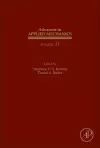
Advances in Applied Mechanics
2 contributors - Hardback
£145.00
Born in Paris, France, in 1975, Stéphane joined in 1999 a joint graduate programme of the French Institute of Technology (Ecole Spéciale des Travaux Publics) and the American Northwestern University. In 2003, he graduated in Theoretical and Applied Mechanics with a Ph.D. from Northwestern University under the guidance of Professor Brian Moran. Between 2003 and 2006, he was at the Laboratory of Structural and Continuum Mechanics at the Swiss Federal Institute of Technology in Lausanne, Switzerland, working under the support of Professor Thomas Zimmermann. In 2006, he became permanent lecturer at Glasgow University’s Civil Engineering Department. Stéphane joined the Computational Mechanics team at Cardiff University on 1st September 2009, as a Professor in Computational Mechanics and directed the institute of Mechanics and Advanced Materials (http://www.engin.cf.ac.uk/research/resInstitute.asp?InstNo=13) from October 2010 to November 2013. He is the Editor of the book series “Advances in Applied Mechanics since July 2013. On November 1st, 2013, he joined the University of Luxembourg as a Professor in Computational Mechanics. http://wwwen.uni.lu/recherche/fstc/research_unit_in_engineering_science_rues/members/stephane_bordas?page=Publications http://scholar.google.fr/citations?hl=fr&user=QKZBZ48AAAAJ The main research axes of his team include: free boundary problems and problems involving complex geometries, in particular moving boundaries : fracture and cutting mechanics, biofilms, tumours… This research direction requires, in particular, devising efficient numerical methods to treat spatially evolving discontinuities, singularities or boundary layers, e.g. enriched/extended finite element methods, meshless/meshfree methods, mixed methods ; this requires also to handle complex geometries, e.g. through generalised isogeometric analysis. ‘a posteriori’ discretisation and model error control, rationalisation of the computational expense : multi-scale homogenisation, algebraic model reduction (proper orthogonal and generalised decomposition) ; with special focus on non-reducible problems, e.g. cutting, fracture, front propagation. The main applications of those two research avenues have been real-time simulation of soft tissue cutting life-time prédiction for heterogeneous materials : composites, elastomers, concrete Stéphane’s keen interest is to actively participate in innovation, technological transfer as well as software tool generation. This has been done through a number of joint ventures with various industrial partners (Bosch GmbH, Cenaero, inuTech GmbH, Siemens-LMS, Soitec SA) and the release of open-source software, available on SourceForge (http://sourceforge.net/users/cmechanicsos). He has been collaborating with over 110 academic partners over the last 10 years. In 2012, Stéphane was awarded an ERC Starting Independent Research Grant (RealTcut), with Pierre Kerfriden as main collaborator, to address the need for surgical simulators with a computational mechanics angle with a focus on the multi-scale simulation of cutting of heterogeneous materials in real time. His publications are in open access here: http://orbilu.uni.lu/simple-search?query=bordas Daniel S. Balint, Imperial College London, UK